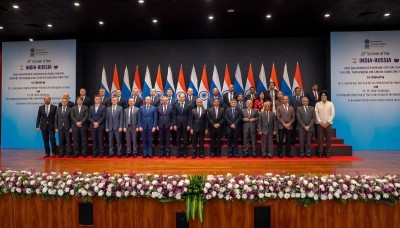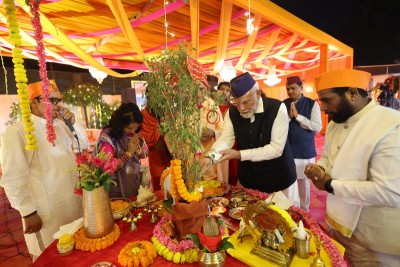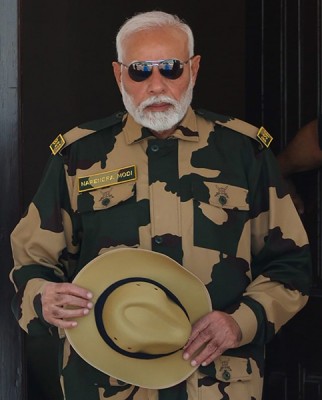
Justice Grinds On, Slowly
On August 13, 2018, International Crimes Tribunal-1 (ICT-1) sentenced to death Mohamad Esahaq Shikder (83), Abdul Goni Hawlader (72), Mohamad Awal aka Awal Moulavi (69), Mohamad Abdus Sattar Pada (65) and Solaiman Mridha aka Soleman Mridha (86) for committing crimes against humanity in the Patuakhali District during the Liberation War in 1971. They were found guilty of two charges for which they were indicted on March 8, 2017. All the five men were handed death sentence for the murder of 17 villagers after torturing them in confinement and setting fire to at least 12 houses after looting them in Itbaria, a village in the Patuakhali District on May 4, 1971. They were also given death sentence for the abduction of 15 women from the same Itbaria village on the same day, taking them to the Circuit House Army camp where they were tortured and raped for 10 days until May 14, 971. All the convicts were involved with the Muslim League (ML) and are behind bars.
On July 17, 2018, ICT-1 sentenced to death Mohamad Akmal Ali Talukder (73), Abdun Nur Talukder (63), Mohamad Anis Miah (76) and Mohamad Abdul Mosabbir Miah (64) for committing crimes against humanity in the Moulvibazar District during the Liberation War of 1971. The war criminals were found guilty of both the charges for which they were indicted on May 7, 2017: the genocide of 59 Hindu villagers, raping six Hindu women, looting 132 houses and setting them on fire in the village Panchgaon on May 7 and May 8, 1971; and the looting of four houses and setting them ablaze, and abducting and murdering two villagers of Pashimbhag on November 24 and November 25, 1971. Akmal, was a local Muslim League (ML) member in 1971, and the three other convicts were associated with Jamaat-e-Islami (JeI). Among them, Akmal is now behind bars while the other three are absconding.
The War Crimes (WC) Trials, which began on March 25, 2010, have thus far indicted 124 leaders, including 50 from the Jamaat-e-Islami (JeI); 27 from the Muslim League (ML); 11 from Nezam-e-Islami (NeI); five from the Bangladesh Nationalist Party (BNP); two each from the Jatiya Party (JP) and Peoples Democratic Party (PDP); 26 former Razakars (a prominent pro-Pakistan militia); and one former Al-Badr member. Verdicts have been delivered against 78 accused, including 52 death penalties and 26 life sentences. So far, six of the 52 people who were awarded the death sentence have been hanged. On September 3, 2016, JeI Central Executive member Mir Quasem Ali (63) was hanged at Kashimpur Central Jail in Gazipur District; on May 11, 2016, JeI Ameer (Chief) Motiur Rahman Nizami (75) was executed at Dhaka Central Jail; on November 22, 2015, JeI Secretary General Ali Ahsan Mohammad Mojaheed (67) and BNP Standing Committee member Salauddin Quader Chowdhury (66) were hanged simultaneously at Dhaka Central Jail; on April 11, 2015, JeI Senior Assistant Secretary General Mohammed Kamaruzzaman (63) was hanged at Dhaka Central Jail; and on December 12, 2013, JeI Assistant Secretary General Abdul Quader Mollah (65), who earned the nickname ‘Mirpurer Koshai (Butcher of Mirpur)’ was hanged at Dhaka Central Jail. 23 others are absconding and another 23 cases are currently pending with the Appellate Division of the Supreme Court. Meanwhile, out of 26 persons who were awarded life sentences, five persons have already died serving their sentence – former JeI Ameer Ghulam Azam (91), who died on October 23, 2014; former BNP Minister Abdul Alim (83), who died on August 30, 2014; former JeI National Assembly member S.M. Yousuf Ali (83), who died on November 17, 2016; former JeI member Gazi Abdul Mannan (88), who died on December 19, 2016; and former ML member Mahidur Rahman (88), who died on May 21, 2018. 13 others are absconding and another eight are lodged in various jails of the country.
Further, on August 16, 2018, ICT-1 reserved the verdict of Liakat Ali (61) and Aminul Islam alias Rajab Ali (62), after the prosecution and the defence completed their closing arguments. According to the prosecution, Liaquat was a member of the anti-liberation ML in 1971 and Rajab Ali was president of the Bhairab Haji Asmat Ali College unit of the Islami Chhatra Sangha, the then student wing of JeI. The accused are on the run and are facing seven charges. According to the first charge, Liaquat and Rajab, supported by Pakistani soldiers, committed mass killing and looting in Krishnapur village in the Habiganj District on September 18, 1971. 43 persons from the Hindu community were shot dead during their raid. The second charge is of mass murder and loot in Chandipur village; the third of mass killing and looting in Gadainagar village; and the fourth of murder in Sadanagar village – all in Habiganj District. The fifth charge involved the abduction and killing of two persons in Fandauk village in Brahmanbaria District, and the sixth and seventh for murder in Sabianagar village in Kishoreganj District. In the closing arguments, Prosecutor Rana Dasgupta prayed to the court to hand down capital punishment for the accused, asserting that the prosecution had proven all charges.
Expressing satisfaction over the trial process, Finance Minister AMA Muhith, in his budget speech at Jatiya Sangsad Bhaban (National Parliament House) in Dhaka on June 7, 2014, observed, “The greatest success of our government, in my opinion, is bringing the war criminals who committed heinous crime against humanity during our liberation war to justice and the execution of the punishment given to the main perpetrators.”
While observing the International Archives Day, in an initiative which is the first of its kind, archiving of war crimes commenced on June 9, 2018. The Directorate of Archives and Libraries organized the handing over ceremony in an auditorium of the National Library of Bangladesh in Dhaka. The Investigation Agency of ICT handed over the documents of four war criminals – Abdul Quader Molla, Salauddin Quader Chowdhury, Chowdhury Moeen Uddin and Ashrafuzzaman Khan – to the Directorate of Archives and Libraries. The documents include written complaints, investigation reports, statements of witnesses, documentary evidence – including books, newspapers and verdicts. The initiative was taken so that future generations can know more about the 1971 Liberation War and the war crimes, and can conduct researches on the issue.
Meanwhile, Prime Minister Sheikh Hasina, while addressing a reception in Toronto in Canada on June 10, 2018, warned, “If the anti-liberation forces and patrons of killers return to power, the country will become a failed one again. Today, Bangladesh is marching forward and the trend of this progress should continue. The country can’t be developed unless there is continuation of the government.” Earlier, holding BNP founder late Ziaur Rahman and incumbent chief of the party Begum Khaleda Zia equally guilty of patronizing war criminals, Prime Minister Hasina observed, on March 25, 2018, "We have held the trial of war criminals and executed the court verdicts. I think it's necessary to equally try those who rewarded the war criminals, gave the national flag to their hands and made them Ministers in independent Bangladesh. The war criminals carried out the genocide. But those who patronised them, made them Ministers, MPs and created scope for them to do politics are equally guilty." In the past, BNP had even joined violent protests called by the JeI and its student wing Islami Chhatra Shibir (ICS), when war crimes verdicts were announced, or death sentences were executed.
However, appeals filed by convicted war criminals or the Government with the Appellate Division of the Supreme Court (SC) have been piling up, as the Apex Court did not hear any of these in over two years. As of March 25, 2018, a total of 23 appeals – 22 filed by convicts and one by the Government – have been pending with the Appellate Division. Mobarak Hossain, Abdus Subhan, ATM Azharul Islam, Syed Mohammad Quasar, Mahidur Rahman, Forkan Mallik, Serajul Haque aka Siraj Master, Khan Akram Hossain, Obaidul Haque Taher, Ataur Rahman Nani, Shamsuddin Ahmed, SM Yousuf Ali, Shamsul Haque, Muhibur Rahman Boro Mia, Mujibur Rahman Angur Mia, Abdur Razzak, Shakhawat Hossain, Billal Hossain, Moslem Prodhan, Abdul Latif, Ujer Ahmed and Yunus Ahmed are the convicts who filed appeals with the Apex Court. The Government also submitted an appeal seeking death penalty for former Jatiya Party lawmaker Abdul Jabbar, who is on the run. On February 24, 2015, ICT-1 sentenced Jabbar to imprisonment until death in absentia for crimes against humanity. The last time the SC heard any appeals, was on February 24, 2016, in proceedings relating to the appeal filed by war criminal and JeI Central Executive member Mir Quasem Ali, challenging his death sentence. On August 30, 2016, the SC upheld the death penalty and Ali was hanged on September 3, 2016.
Investigators, prosecutors and war crimes trial campaigners have been frustrated by the delay. On March 21, 2018, Sanaul Huq, Co-coordinator, Investigation Agency, ICT stated, “Witnesses and other stakeholders are frustrated. We have to face many questions from them.” Similarly, Tureen Afroz, a senior member of the tribunal's prosecution team, noted, “Due to backlogs in the SC, convicts were getting ‘biological impunity’ as they were gradually moving towards natural death. It is not acceptable at all. We have worked hard to complete the trials quickly. We are not seeing any speed at the SC. It is frustrating.” Likewise, Shahriar Kabir, President of Ekattarer Ghatak Dalal Nirmul Committee(Committee for Resisting Killers and Collaborators), observed, “We are aggrieved. We know, there is a huge backlog of cases in the Supreme Court and that is why we suggested (to) the last chief justice on several occasions to form a separate appeal chamber at the tribunal building where the judges would sit on two or three days a week. These are not ordinary cases. These involve 30 lakh (three million) martyrs. It is unfortunate that the SC is not taking this into consideration.”
New verdicts against war crime perpetrators have once again reaffirmed the Awami League-led Government’s determination to honour its 2008 General Election pledge to bring the War Criminals of the 1971 genocide to justice. The achievements on this count are already remarkable, but laxity on the part of the Apex Court has provoked growing resentment. A long process remains before the trials and appeals can be brought to their eventual conclusion.
Support Our Journalism
We cannot do without you.. your contribution supports unbiased journalism
IBNS is not driven by any ism- not wokeism, not racism, not skewed secularism, not hyper right-wing or left liberal ideals, nor by any hardline religious beliefs or hyper nationalism. We want to serve you good old objective news, as they are. We do not judge or preach. We let people decide for themselves. We only try to present factual and well-sourced news.







